- Home
- Karen Kingsbury
Like Dandelion Dust Page 11
Like Dandelion Dust Read online
Page 11
“No.” Molly dropped her hands and dabbed her fingertips beneath her eyes. She felt the fight rising up inside her. All morning at the pool, her feelings had warred within her. She’d be swimming next to Joey and she’d surface for air just as sharp terror made it impossible to draw a breath. Joey was everything to her—they wouldn’t dare take him. Then she’d dive down to the floor of the pool and suddenly she’d be a mother bear, willing to do anything, all things, for the sake of her child.
Now she looked at Beth and grabbed a quick breath. “A judge in Ohio ruled earlier this week that custody will revert back to his birth parents in a few months. Because someone forged the father’s name.”
“It was probably the mother.” Beth leaned her shoulder into the sofa. Her eyes never left Molly’s. “Didn’t you say the father was in prison for domestic violence when you adopted Joey?”
“Yes.” She crossed her arms and pressed them to her waist. “He’s out now.”
“So if the mother forged his name, isn’t that something the two of them have to work out?”
Molly narrowed her eyes, trying to remember. “The social worker said they didn’t know who signed his name. So I guess they’re ruling out his birth mother.”
“That’s crazy.” Beth’s voice rang with frustration. “What sort of protection does that give any adoptive parent?” She waved her hand in the air. “If birth parents can come back years later and complain about the paperwork, then no one’s safe.” She hurried on. “You’re fighting it, of course.”
“Jack’s on his way to Miami right now. Our lawyer recommended some big shot in the city.” Her shoulders had been tense, and she lowered them. Relax, Molly. . . . Everything’s going to be okay. “Jack says not to worry; he’ll take care of it.”
“Good.” Beth stood and put her hands on her hips. “The whole thing’s insane. Imagine, taking a healthy child out of the only home he’s known, the place where he’s lived for nearly five years.” She clenched her fists. “No one in their right mind would do that.”
“Exactly.” Molly savored the strength of Beth’s words. Beth had always been more a fighter than a victim. “We should know something later today.”
Beth’s expression softened. “I know it’s going to work out. It has to.”
“It will.” Molly repeated the words in her head for good measure. It will work out; it will. She drummed her fingers lightly on her knees. “Still, I wish there was something we could do today, this afternoon.”
The fight left Beth. She sat down next to Molly. “There is.” She held out her hands. “We can talk to God.”
“I don’t—” Molly started to bristle, but immediately she changed her mind. Beth had a Bible verse for every occasion. Suddenly, Molly wanted to know. “What would the Bible say about this? About a child’s future . . . or losing a child, fighting for a child?”
Beth didn’t hesitate. “Well, Scripture has a lot to say about children and the battles we fight in life.” She held out her thumb. “First and most important, there’s a verse in Jeremiah that says God knows the plans He has for us, plans to give us a hope and a future and not to harm us.”
Molly thought that over. If it was true, then God had plans for Joey. Good plans. The news settled some of her anxiety. “What else?”
“I could get you a Bible promise book. That way you could look at Scripture by topics.”
“Okay. I’d like that.” Molly could hardly believe this was her talking. But with Joey’s future on the line, she was willing to try anything. She looked at her watch. “As long as Joey’s sleeping, maybe you could show me some of the verses now.”
Beth did exactly that. Until Joey woke up from his nap they looked at Bible verses, and before she left, they even held hands and Beth prayed. All her life, Molly hadn’t paid God any heed whatsoever. It seemed unfair that she should wait until now—her most dire hour—to consider whether He was really there, whether He could help her. For that reason, their conversation about God felt strange and even awkward. But when they finished talking, Molly had something she hadn’t gotten from Jack or from the knowledge that he was at the attorney’s office, or even from Beth.
She had peace.
Chapter Ten
Wendy was giddy with the way things were working out.
As long as she didn’t think of her son’s adoptive parents, as long as she didn’t dwell on the loss they were about to experience, she went through each day happier than she’d ever been. Rip was home and handling himself carefully. He was looking for a job, and he’d already had two interviews at the movie theater. The manager position looked like a lock—which meant maybe in six months they could afford a bigger rental. But most of all, their son was coming home.
His name was Joey.
Allyson Bower had given them more information after the judge ruled in their favor. Now, in ten or fifteen minutes, Allyson would stop by to make sure their home was suitable for a child. After that, there’d be nothing left but the waiting. Joey would make his first visit to Ohio in two weeks.
Wendy grabbed a dishrag and washed down the kitchen counter one more time. Tigger, the cat, knew better than to walk up near the dishes, but sometimes he forgot. Cat hair on the counter wouldn’t look good to a social worker.
Tigger rubbed up against her ankles and mewed loudly.
“Later, kitty.” It was almost noon, Tigger’s favorite time to eat. “Mama’s busy.”
She worked the sponge over each section, careful to leave the counter cleaner than ever before. When she finished, she looked around the kitchen again. Everything was spotless. Rip had bought a jar of putty, and while he was out looking for work she’d patched up the hole in the wall. Yes, everything was in order.
But maybe Allyson would be hungry. The smell of something cooking in the oven was bound to make the place feel more like home. She opened the freezer, pulled out a can of pop-up cinnamon rolls, and read the directions. Five minutes later they were in the oven. She washed her hands and dried them on the worn-out kitchen towel folded by the sink. The nice one, the one with the blue stripes, was hanging neatly on the oven door. Wendy leaned back against the counter and caught her breath. Life had been one continuous blur since their meeting with the social worker.
The first good news was the report from the handwriting expert. No question, Rip hadn’t signed the adoption documents. She had held her breath when Allyson gave her the news over the phone. If the department suspected her of signing the papers, the accusation would’ve come then.
It didn’t.
Instead, a few days later, Allyson called again and told them to be at a hearing the following morning. Judge Rye Evans would be looking at the case and making a decision. Rip and Wendy wore their best clothes, and Rip looked more handsome than he had when they got married.
The typing lady next to the judge couldn’t keep her eyes off him.
Allyson did most of the talking. She told the judge that it had come to her attention that the adoption file involving the Porters contained a forged signature. She had no enthusiasm for the case; that much was obvious. At one point—after she presented the results from the handwriting expert—Allyson looked at the judge and said nothing for half a minute.
Finally she held up the file. “I have to say, Your Honor—this department does not believe it’s in the best interest of the child to remove him from his adoptive home.”
The judge nodded. He wore a scowl through most of the hearing, and he kept looking at a stack of papers on his desk. He asked about Rip’s criminal background. Two assault convictions and a five-year sentence for domestic violence. Then he put Rip on the stand.
The questions were easy. Had Rip been through rehabilitation? Yes. Did he feel he’d learned his lesson? Of course. Was he a changed man? Definitely. Could he handle being a father? Yes, he was looking forward to it. Had he thought about how to discipline a child without resorting to rage? Yes, he would continue with counseling to make sure he was on the right track.
She was next. The judge asked even less of her. At one time she had wanted to give this child up for adoption, right? Yes, given the situation. But now she wanted to raise this boy with her husband? Right. She explained her motives. She hadn’t thought he wanted the boy. Now she could only pray they’d have the chance they lost almost five years ago.
That was all.
Allyson sat at the front of the courtroom at a long table. Every now and then she looked at the file and shook her head. At one point she stood and asked the judge if he could postpone his decision until the adoptive parents had a chance to testify.
“Fraudulent paperwork is not of any consideration by the adoptive parents.” The judge peered down from his elevated position. He looked almost sad. “If a birth parent’s signature was forged, the adoption is no longer valid.” He slumped a little. “You know that, Mrs. Bower.”
She nodded and sat down.
The judge took half an hour to look over the paperwork and the information in the file. When he returned, his decision was quick. He used a lot of big words, lots that Wendy didn’t understand. She held tightly to Rip’s hand, waiting for the bottom line. Finally he said, “Therefore it is my duty under the laws of the state of Ohio to revert custody of this minor to his birth parents.”
Allyson was on her feet again. She told the judge it wouldn’t be fair to call the boy’s adoptive parents and demand that they release him right away, with no warning. The judge agreed. He came up with a plan that Joey would have three visits over the next few months, and then he’d come to live with Rip and Wendy for good.
“Honey!” Rip’s voice called from the bedroom, snapping her back to the present. “Where’re my socks? I can’t find a clean pair!”
“Oh, sorry.” She jolted into action. How could she have forgotten? She’d done all the laundry, but the last load was still in the dryer. “Just a minute.”
“Hurry up,” he snapped. His temper had been a little short lately. Probably the stress of the meeting they were about to have.
She would’ve run across broken glass to keep Rip from being upset today. The social worker wouldn’t just be assessing whether they had enough bedrooms. She would look for signs that Rip’s anger was still a problem. Both of them knew it.
The dryer door was open, the clothes inside still damp. She must’ve forgotten to start it. Fear seized her. Rip would never stand for wet socks, never. She slammed the door shut, added twenty minutes to the cycle, and pushed the Start button. She looked around, frantic. What to do next? How could she get a pair of clean dry socks for Rip in the next half a minute?
Then it hit her. She raced around the corner, into their bedroom and past Rip.
“What’re you doing?” He twisted his face, frustrated. “Where’s my socks?”
“The dryer’s acting up.” She pulled a pair of athletic socks from her own drawer, and hurried to him. “Here. Wear these. You can change later.”
He jerked them from her hand. “I hate wearing your socks.”
“I know. I’m sorry.” She gave him a weak smile. “The dryer’s working now.”
“Fine.” He huffed at her. “Is the house clean?”
“Perfectly.”
“Good.” He sat on the edge of the bed and slipped the socks on. Then, as if it had just occurred to him that he wasn’t acting very nice, he nodded at her. “Thanks for picking things up.”
She felt herself light up inside. “You’re welcome.” She sat on the edge of the bed beside him. “I’d do anything to make this work.”
“It will.” Determination rang in his voice. “He’s our little boy. I wish we were getting him back without all this visit garbage. As if we were some sort of strangers.”
“Well . . .” She twisted her fingers together. She hated to go against him. “We sort of are strangers. For now, I mean.” She uttered a nervous laugh. “He doesn’t know us.”
“He’ll know us right off.” Rip barked the words, but he kept his tone low. “Kids know their parents.”
“Right.” Wendy kept herself from saying that at this point Joey’s parents were the nice couple in Florida. She understood what Rip meant. A child would know his birth parents simply because they were blood-related. She weighed the idea. Yeah, that might be true. Why not?
There was a knock on the door. “Get it.” Rip gave her a quick shove. “I’ll be right there.”
“Okay.” She hurried out of the room, straightening her beige slacks and patting her hair nice and neat. She opened the door and smiled at Allyson Bower. “Hello . . . come in.”
“Hello.” The social worker didn’t look happy. “This shouldn’t take long.” She had a file in her hand and she stepped inside.
Only then did Wendy notice the curls of smoke coming from the oven. “Oh, no!” She gasped. “The cinnamon rolls!” She raced across the living room to the adjoining kitchen, grabbed a potholder, opened the oven door and yanked the tray out and onto the counter.
Allyson was a few steps behind. “Can I help?”
“No, it’s okay.” Wendy turned off the oven and shut the door. She’d let them cook four minutes longer than she was supposed to. Between the smoke and the blackened tops on every roll, the batch was a complete loss. She gave Allyson a quick smile over her shoulder. “My oven cooks a little hot lately.”
At that moment, Rip came into the room. He smelled the smoke and frowned. “What happened?”
“I’m not sure.” Another nervous laugh as she quickly dumped the burned rolls into the trash. “I guess the oven’s cooking hotter than usual.”
Allyson was getting situated at the kitchen table, so she didn’t see the glare Rip gave Wendy. The minute the social worker looked up, Rip’s expression changed to a smile. “Those electric ovens are touchy.”
Wendy flipped on the exhaust fan over the stove and opened a window. She fanned at the smoke that still hung in the air. Then she pulled a few apples from the fridge, sliced them onto a plate, and brought them to the table. She took the seat between Rip and Allyson. “Okay.” She smiled at her husband and then back at the social worker. “I guess we’re ready.”
The meeting didn’t last long. There were questions about their daily schedules, and how available either of them would be for Joey. Wendy worked just one job now—a secretarial position at a local accounting firm. She explained that she’d be gone nine to five, but that she had eighteen sick days built up in case Joey needed her for something.
“Otherwise, what’s the plan for the child?”
“Day care.” Rip made the word sound like a reward, like Disneyland. “We’ve got a great little place a few blocks away. Clean and friendly. Affordable.”
“What about you, Mr. Porter? What will your work hours be?”
He stuck out his chest just enough for Wendy to notice. “I’m waiting to hear from the movie theater in town. They’re considering me for the manager position. I’ll work nights, of course. Otherwise I’ll watch Joey, and most days we won’t have to worry about day care.”
The look on Allyson’s face said she wasn’t sure that was a good thing. She wrote something in her file. “Okay.” She looked up. “I’ll take a look around.” She pointed toward the hallway. “Two bedrooms, right? One for you, one for the boy?”
“Right.” Again Rip took the lead down the hall. Allyson followed, and Wendy was last. The rooms were small, but clean and neat. The social worker said nothing as she looked through each bedroom door and then at the bathroom at the end of the hall. “Full bath?”
“Yes.” Rip sounded proud. “There’s another one off the living room.” He hesitated. “Of course, after I get the manager position at the theater, we’ll have much more money. We’d like to rent a bigger house, something near the nicer schools. For when our son starts kindergarten.”
Allyson looked at him, but again she said nothing. When they finished the
tour, she wrote something else in her file. This time she led the way into the kitchen, where she motioned to the refrigerator. “May I?”
“If you can stand the smoke.” Rip chuckled, but as soon as Allyson put her back to them, he scowled and shook his head.
The social worker gave the refrigerator a quick scan. Milk and eggs, cheese and vegetables. They’d gone shopping the night before and made sure the food was healthy and fresh. Allyson checked a few of the cupboards and asked about first aid. Wendy showed her a kit in one of the kitchen drawers.
After another few minutes she lowered the file to her side. “That’s all I have.” She nodded at them. “Thanks for opening up your house.” She was heading out when she stopped and looked at the patched wall. Her brow lowered and she ran her finger over the patch. Then she turned and looked straight at Rip. “What’s this?”
“My fault.” Wendy took a step forward. She shrugged her shoulders and did a flustered laugh. “I was sweeping the other day, and pow! I poked the broom handle straight through the wall. Can you imagine?”
The look Allyson gave her said that no, she could not imagine any such thing causing a hole in the wall. She made a note in her file, nodded once more to the two of them, and told them she’d be in touch. Then she was gone.
As soon as the door closed behind her, Rip was in Wendy’s face. “Burned rolls?” He forced the words through tight teeth. “Is that your idea of a good impression?” He groaned out loud and paced to the stove and back. The house was small, so his steps took only a few seconds.
“I thought they’d smell nice.” She didn’t want to fight with him. “Allyson didn’t care. She even offered to help.” Which was more than he had done. “Come on, Rip. Don’t be mad.”
“Mad?” His face was red now. His eyes bulged the way they did when he was about to lose it. “I’m beyond mad.” He gave a sharp wave toward the laundry room. “First my socks.” Another sharp wave toward the kitchen. “Then the rolls.” He stormed over to the patched-up wall. He reared back and with a single ferocious blow he slammed his fist through the spot once more. He glared at her, plaster hanging from his knuckles the way it had before. “Then this.” He took a few threatening steps toward her. “Your lousy repair job.”

 Shades of Blue
Shades of Blue Divine
Divine Forever
Forever Summer
Summer The Snake and the Spider
The Snake and the Spider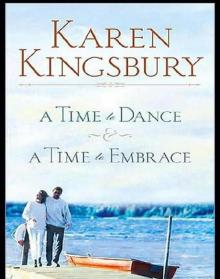 A Time to Dance
A Time to Dance Remember Tuesday Morning
Remember Tuesday Morning A Treasury of Miracles for Women
A Treasury of Miracles for Women Like Dandelion Dust
Like Dandelion Dust Brush of Wings
Brush of Wings The Tuesday Morning Collection
The Tuesday Morning Collection A Moment of Weakness
A Moment of Weakness Ever After
Ever After This Side of Heaven
This Side of Heaven Unlocked: A Love Story
Unlocked: A Love Story Take One
Take One The Red Gloves Collection
The Red Gloves Collection To the Moon and Back
To the Moon and Back Just Beyond the Clouds
Just Beyond the Clouds Oceans Apart
Oceans Apart A Baxter Family Christmas
A Baxter Family Christmas Fame
Fame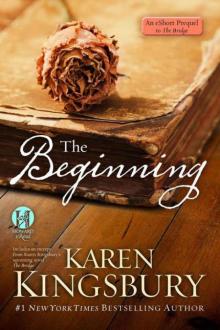 The Beginning
The Beginning On Every Side
On Every Side Gideon's Gift
Gideon's Gift Forgiven
Forgiven A Kingsbury Collection
A Kingsbury Collection Found
Found Family
Family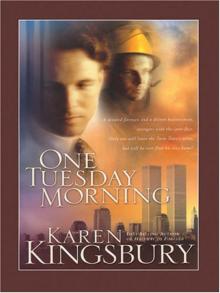 One Tuesday Morning
One Tuesday Morning Someday
Someday Take Three
Take Three Beyond Tuesday Morning
Beyond Tuesday Morning Unlocked
Unlocked Take Four
Take Four Never Grow Up
Never Grow Up Where Yesterday Lives
Where Yesterday Lives Two Weeks
Two Weeks When Joy Came to Stay
When Joy Came to Stay Halfway to Forever
Halfway to Forever Best Family Ever
Best Family Ever Sunrise
Sunrise Angels Walking
Angels Walking A Treasury of Miracles for Friends
A Treasury of Miracles for Friends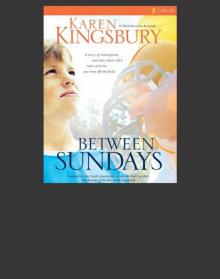 Between Sundays
Between Sundays A Treasury of Miracles for Teens
A Treasury of Miracles for Teens A Thousand Tomorrows / Just Beyond the Clouds
A Thousand Tomorrows / Just Beyond the Clouds Finding Home (A Baxter Family Children Story Book 2)
Finding Home (A Baxter Family Children Story Book 2) Waiting for Morning
Waiting for Morning Chasing Sunsets
Chasing Sunsets Two Weeks: A Novel (The Baxter Family)
Two Weeks: A Novel (The Baxter Family) Coming Home
Coming Home Final Vows
Final Vows Sunset
Sunset Even Now
Even Now Fifteen Minutes: A Novel
Fifteen Minutes: A Novel Love Story
Love Story The Bridge: A Novel
The Bridge: A Novel One Tuesday Morning & Beyond Tuesday Morning Compilation
One Tuesday Morning & Beyond Tuesday Morning Compilation Truly, Madly, Deeply
Truly, Madly, Deeply The Chance: A Novel
The Chance: A Novel A Brush of Wings
A Brush of Wings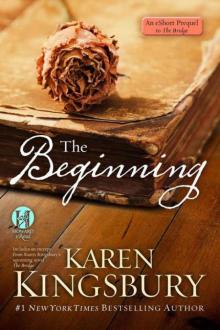 The Beginning: An eShort Prequel to the Bridge
The Beginning: An eShort Prequel to the Bridge A Thousand Tomorrows & Just Beyond The Clouds Omnibus
A Thousand Tomorrows & Just Beyond The Clouds Omnibus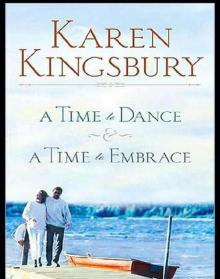 A Time to Dance/A Time to Embrace
A Time to Dance/A Time to Embrace In This Moment
In This Moment Rejoice
Rejoice Coming Home: A Story of Undying Hope
Coming Home: A Story of Undying Hope